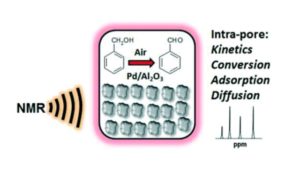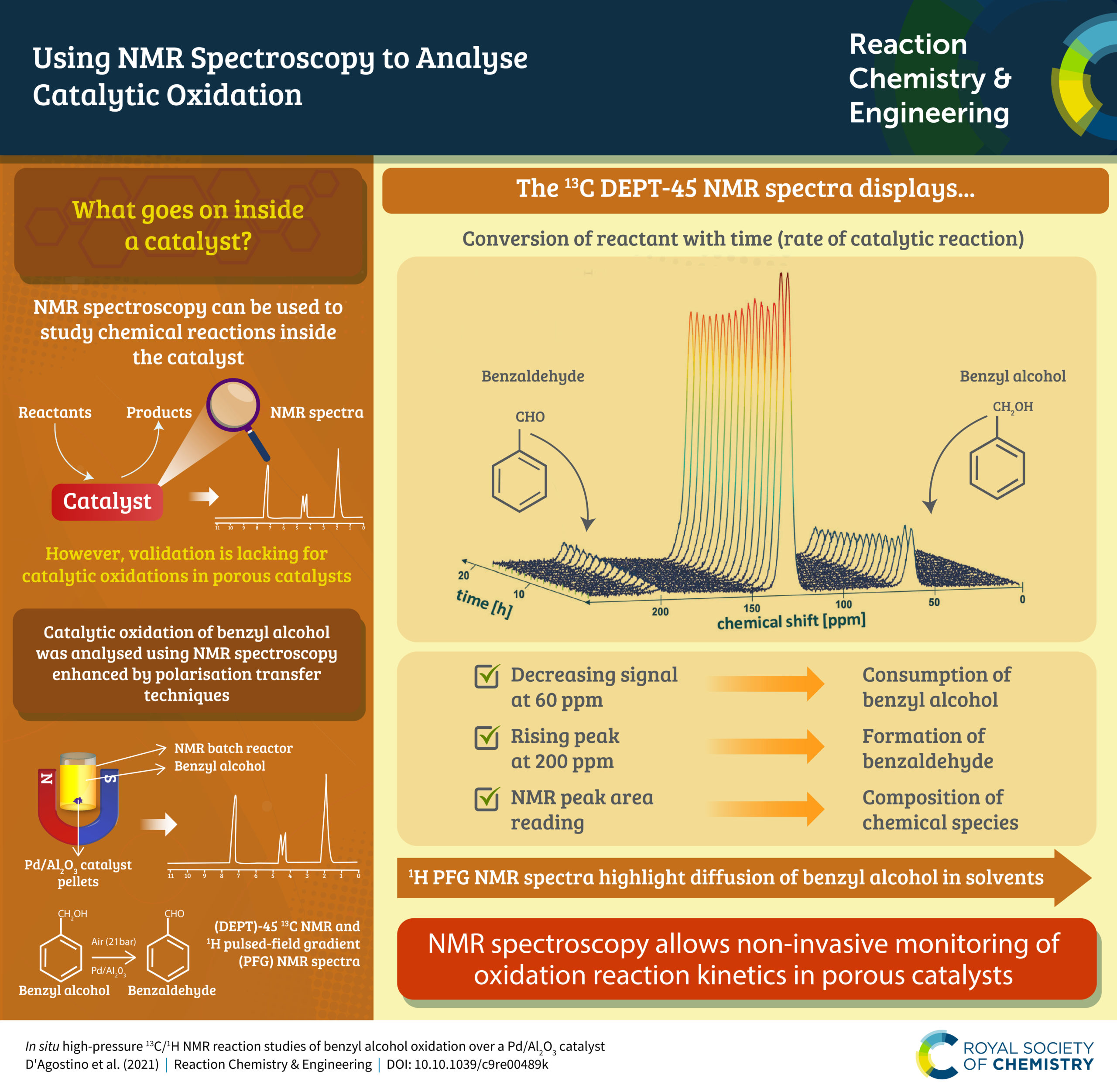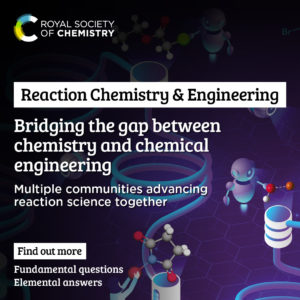It is our great pleasure to announce Dr Carmine D’Agostino (University of Manchester, UK) as the winner of the 2020 Reaction Chemistry & Engineering Outstanding Early-Career Paper Award.
This is in recognition of his leadership of the paper:
In situ high-pressure 13C/1H NMR reaction studies of benzyl alcohol oxidation over a Pd/Al2O3 catalyst
by Carmine D’Agostino, Mick D. Mantle and Lynn F. Gladden
React. Chem. Eng., 2020, 5, 1053-1057
DOI: 10.1039/c9re00489k
Please join us in congratulating Dr D’Agostino!
Carmine D’Agostino received his BEng and MEng in Chemical Engineering at the Universita’ di Napoli “Federico II” and a PhD in Chemical Engineering at the University of Cambridge under the supervision of Prof. Lynn Gladden. He is currently a Senior Lecturer in Chemical Engineering at The University of Manchester. His research focuses on diffusion, dynamics and adsorption of complex fluids and fluids within porous structures, with applications in catalysis, sustainable process engineering and CO2 capture and conversion. He received several awards, including the Young Scientist Award at the International Congress on Catalysis, the Reaction Chemistry & Engineering Emerging Investigator, the Junior Moulton medal from the Institution of Chemical Engineers (IChemE) and a prestigious Junior Research Fellowship at the University of Cambridge.
An interview with Dr Carmine D’Agostino
Can you briefly summarise this paper?
This work investigates high-pressure aerobic catalytic oxidation reactions over heterogeneous catalyst surfaces using in-situ NMR spectroscopy for monitoring non-invasively reaction kinetics, diffusion and adsorption.
What aspect of your work are you most excited about at the moment?
Traditional catalytic studies focus on the analysis of reaction products and kinetics carried out by sampling the bulk liquid surrounding the catalyst particles and using an off-line analytical tool, such as a GC for example. In addition, aspects such as diffusion and adsorption are often neglected, yet in practical terms are very important aspects to consider when engineering a catalytic process. Using our in-situ NMR approach, we are able to detect directly and in real-time what is happening inside the nanopores of the heterogeneous catalyst used to catalyse the oxidation reaction, hence we obtain intra-particle information on the reaction. In particular, we can probe the evolution of reaction products as they form inside the catalyst pores and, in addition to that, monitor mass transport by diffusion and adsorption phenomena, giving a comprehensive picture of the physico-chemical phenomena within the reaction system at a pore-scale level.
Among the main challenges encountered, one was certainly the design of a suitable high-pressure reactor for NMR studies, which had to be made without metals in order to be compatible with the magnetic fields involved in the experiments. In addition, we also needed to think about detection and quantification of NMR signal, which was not straightforward to do when having reactive fluids in porous catalysts.
This proof-of-concept demonstrates that it is possible to use NMR for monitoring high-pressure catalytic reactions and this can be very beneficial, for example it is non-invasive and we can potentially detect products or intermediates ‘trapped’ inside the catalyst pores and therefore not detected by analysis of bulk fluid.
Where do you see the future of your field of work in the next five years?
Our work was focused on a proof-of-concept using a relatively simple catalytic reaction, an oxidation of an alcohol. The application of the same concept to more complex reaction pathways could certainly be part of future work in this area. There are for example more complex oxidation processes, such as those involving glycerol as the feedstock, whereby product distribution is complex and many of these products can remain within the catalyst due to slow diffusion and desorption. Using in-situ NMR in such cases could certainly provide new insights into these systems. Another area of interest could be on the study of gas-phase reaction systems, such as methanation and CO2 conversion.
How do you feel about Reaction Chemistry & Engineering as a place to publish research on this topic?
Reaction Chemistry & Engineering was indeed the ideal journal for this work, which has strong chemistry components but also encompasses key aspects of chemical and reaction engineering, for example the investigation of mass transport and adsorption. I think the journal does excellently in bridging aspects of chemistry and engineering and is the ideal forum for many inter-disciplinary works in these areas.
How do you like to spend your time when not doing research?
Apart from my academic work, I enjoy playing musical instruments such as piano or electric guitar (I used to play at departmental annual dinners as well!), watch science fiction and fantasy movies, spending time with my family, hiking and walking in natural reserves, and well, I still play videogames sometimes, especially those that reminds me of my childhood! I also enjoy cooking and making cakes, I can make a very nice and authentic Italian Tiramisu’ and even some complex recipes of the region where I am from, the Campania region of Italy.
Can you share one piece of career-related advice or wisdom for those beginning their research career?
I think the main key drivers to success in research are enthusiasm, motivation and curiosity. There are of course other important skills such as organisational and communication skills, but without those underpinning drivers, I think they are not enough. Research work can be quite frustrating sometimes, especially when plans are not working and everything seems to be going in the wrong direction. I remember often during my PhD when experiments were not working and I used to feel very frustrated and demoralised. What made me go ahead was exactly the enthusiasm I had about the work I was doing and the curiosity to find out or discover more about the field of research I was working on, and I try to transmit these values also to my PhD students.
About the award
The aim of the Reaction Chemistry & Engineering Outstanding Early-Career Paper Award is to recognise a researcher in the earlier stages of their research career for their leadership in reporting original research published in the journal.
The journal Editorial Board award this prize annually, selecting the paper which they find to demonstrate the highest quality of research, as well as importance to the advancement of the field of reaction engineering, out of all qualifying papers published in the journal each year.
In order to be eligible for this award, the candidate must:
- Be listed as a corresponding author on the paper
- Currently be an independent research leader
- Have either a) received their PhD on or after 1st January of the year 12 years prior to the award year (2008 for prize year 2020) or b) spent no more than an equivalent amount of time in research when taking into account any career breaks.
- Not be a previous winner of this award
Selection Process
In order to choose the winner of the 2020 Reaction Chemistry & Engineering Outstanding Early-Career Paper Award, a shortlist of articles that were published throughout the year were selected by the editorial office and then subsequently assessed by the journal’s Editorial Board members. The winner was selected based upon the significance, impact and quality of the research.
Prize
The winner of the Reaction Chemistry & Engineering Outstanding Early-Career Paper Award will receive an engraved plaque, a bespoke infographic from Impact Science for the winning paper and £500 cash award that would be used for conference travel/attendance of their choice.
To have your paper considered for the 2021 Reaction Chemistry & Engineering Outstanding Early-Career Paper Award, indicate when prompted upon submission of your revised manuscript if a corresponding author of the paper fulfils these criteria. Multiple eligible authors of a winning paper will share the prize fund equally. You can contact the editors at reactionchemeng-rsc@rsc.org if you have any queries.













